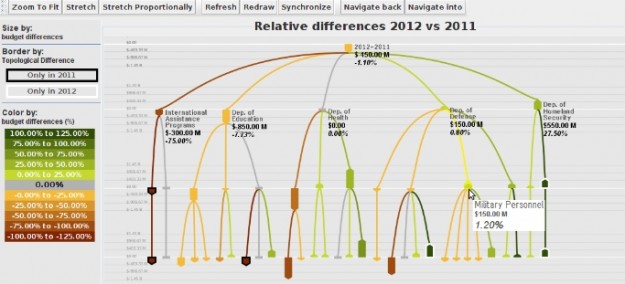|
A destination on the Interweb to brighten your day (now get back to work!)
Sunday, May 27, 2012
BuzzFeed Latest: 25 Things To Do With Your Books When You Get A Kindle and More!
FlowingData - Thoughts on the HCIL symposium
| ||||||||||||||||||
ScienceDaily: Most Popular News
ScienceDaily: Most Popular News |
- New prostate cancer screening guidelines face a tough sell, study suggests
- Tongue analysis software uses ancient Chinese medicine to warn of disease
- Skp2 activates cancer-promoting, glucose-processing Akt
- It's in the genes: Research pinpoints how plants know when to flower
| New prostate cancer screening guidelines face a tough sell, study suggests Posted: 26 May 2012 04:13 PM PDT Recent recommendations from the US Preventive Services Task Force advising elimination of routine prostate-specific antigen screening for prostate cancer in healthy men are likely to encounter serious pushback from primary care physicians, according to results of a new survey. |
| Tongue analysis software uses ancient Chinese medicine to warn of disease Posted: 26 May 2012 04:13 PM PDT Researchers have developed computer software that automatically analyzes images of the tongue, one of the measures used to classify the overall physical status of the body, or zheng, in Chinese traditional medicine. |
| Skp2 activates cancer-promoting, glucose-processing Akt Posted: 26 May 2012 04:12 PM PDT E3 ligase's role makes it target for defeating Herceptin resistance, stifling cancer's preferred diet. |
| It's in the genes: Research pinpoints how plants know when to flower Posted: 26 May 2012 04:12 PM PDT Scientists believe they've pinpointed the last crucial piece of the 80-year-old puzzle of how plants "know" when to flower. |
| You are subscribed to email updates from ScienceDaily: Most Popular News To stop receiving these emails, you may unsubscribe now. | Email delivery powered by Google |
| Google Inc., 20 West Kinzie, Chicago IL USA 60610 | |
ScienceDaily: Top Health News
ScienceDaily: Top Health News |
- New prostate cancer screening guidelines face a tough sell, study suggests
- Tongue analysis software uses ancient Chinese medicine to warn of disease
- Skp2 activates cancer-promoting, glucose-processing Akt
- Why humans don't smell as well as other mammals: No new neurons in the human olfactory bulb
- Women trying to have babies also need to think about circadian clock
| New prostate cancer screening guidelines face a tough sell, study suggests Posted: 26 May 2012 04:13 PM PDT Recent recommendations from the US Preventive Services Task Force advising elimination of routine prostate-specific antigen screening for prostate cancer in healthy men are likely to encounter serious pushback from primary care physicians, according to results of a new survey. |
| Tongue analysis software uses ancient Chinese medicine to warn of disease Posted: 26 May 2012 04:13 PM PDT Researchers have developed computer software that automatically analyzes images of the tongue, one of the measures used to classify the overall physical status of the body, or zheng, in Chinese traditional medicine. |
| Skp2 activates cancer-promoting, glucose-processing Akt Posted: 26 May 2012 04:12 PM PDT E3 ligase's role makes it target for defeating Herceptin resistance, stifling cancer's preferred diet. |
| Why humans don't smell as well as other mammals: No new neurons in the human olfactory bulb Posted: 24 May 2012 06:22 AM PDT The human olfactory bulb – a structure in the brain that processes sensory input from the nose – differs from that of other mammals in that no new neurons are formed in this area after birth. The discovery is based on the age-determination of the cells using the carbon-14 method, and might explain why the human sense of smell is normally much worse than that of other animals. |
| Women trying to have babies also need to think about circadian clock Posted: 23 May 2012 05:07 PM PDT A new study shows that the biological clock is not the only clock women trying to conceive should consider. The circadian clock needs attention, too. The findings draw a clear line between disrupted circadian rhythms and reproductive physiology. The researchers are the first to show that if you disrupt the circadian clock environmentally in mice, with repeated changes in their light-dark cycles, there are problems with pregnancy outcomes. And the effect can be dramatic. |
| You are subscribed to email updates from ScienceDaily: Top Health News To stop receiving these emails, you may unsubscribe now. | Email delivery powered by Google |
| Google Inc., 20 West Kinzie, Chicago IL USA 60610 | |
The Cynical Girl: Day Off
The Cynical Girl: Day Off |  |
| Posted: 26 May 2012 03:45 AM PDT |
| You are subscribed to email updates from The Cynical Girl To stop receiving these emails, you may unsubscribe now. | Email delivery powered by Google |
| Google Inc., 20 West Kinzie, Chicago IL USA 60610 | |
ScienceDaily: Top Science News
ScienceDaily: Top Science News |
| It's in the genes: Research pinpoints how plants know when to flower Posted: 26 May 2012 04:12 PM PDT Scientists believe they've pinpointed the last crucial piece of the 80-year-old puzzle of how plants "know" when to flower. |
| Maya collapse: Trade patterns for crucial substance played key role Posted: 23 May 2012 10:55 AM PDT Shifts in exchange patterns provide a new perspective on the fall of inland Maya centers in Mesoamerica approximately 1,000 years ago. This major historical process is sometimes referred to as the "Maya collapse." |
| You are subscribed to email updates from ScienceDaily: Top Science News To stop receiving these emails, you may unsubscribe now. | Email delivery powered by Google |
| Google Inc., 20 West Kinzie, Chicago IL USA 60610 | |


















